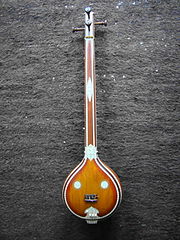Mukhari
This article includes a list of general references, but it lacks sufficient corresponding inline citations. (July 2020) |
| Arohanam | S R₂ M₁ P N₂ D₂ Ṡ |
|---|---|
| Avarohanam | Ṡ N₂ D₁ P M₁ G₂ R₂ S |
Mukhari (pronounced mukhāri) is a rāga in Carnatic music (musical scale of South Indian classical music). It is a janya rāga of Kharaharapriya. An emotional raga, it can sound very sorrowful and introspective. And of course, devotional as well. It sounds best in a very slow speed, with each note and gamaka enunciated clearly. However, there are some crisper renditions of this raga which are also enjoyable. Some well known and often heard compositions are Sivakama Sundari by Papanasam Sivan, Sangeeta Shastra and Entani Ne by Tyagaraja, Emani Ne by Subbaraya Shastri, Arivar Yaar by Arunachala Kavi and Endraikku Shiva Krupai by Neelakanta Sivan.
| Carnatic music |
|---|
 |
| Concepts |
| Compositions |
| Instruments |
|
Structure and Lakshana
[edit]Popular Compositions
[edit]- Indu Enage Govinda by Raghavendra Swami (Also sung in Mukhari)
- Palisemma Muddu Sharade, Chitta Shuddhi illadava By Purandara Dasa
- Brahma Kadigina Padamu by Annamacharya
- Pahimaam Rathnachala by Muthuswami Dikshitar
- Entaninne by Tyagaraja
- Ksheenamai by Tyagaraja
- Karubaru Cheyuvaru by Tyagaraja
- Elavatara by Tyagaraja
- Sangeeta Sastra by Tyagaraja
- Talachi Nantane by Tyagaraja
- Muripemu by Tyagaraja
- Endraikku Siva Krupai by Neelakanta Sivan
- Emani Ne by Subbaraya Sastri
- Ososi Namadi by Kshetrayya
- Dasaratha Rama by Bhadrachala Ramadasu
- Sivakama sundari by Papanasam Sivan[1]
- Krishnam Kalaya by Narayana Teertha
- Palimpavamma by Syama Sastri
Less-known Compositions
[edit]Anandam Anandam Anandame, which is played by the orchestra at a Tamil Hindu wedding, immediately after the groom ties the mangalsutra on the bride's neck, evoking emotions of happiness and sorrow between the groom and bride's family members. Jalamika Valadhura is a very rare, short Swarajati composed in the same Raga. Govindarajam Upasmahe is a very rarely heard Krithi of Muthuswami Dikshitar, probably rendered only by R Vedavalli.
Meaning
[edit]A raga that is colourful, well-known and full of emotive appeal is Mukhari. This raga is often spoken of as a sorrowful raga ( shoka rasa ), but in reality it also exudes bhakthi rasa and shanta rasa effectively. Mukhari’s allied ragas include Huseni, Bhairavi, Salagabhairavi, Kokilavarali and Maanji. Mukhari has to be enunciated with very precise swara positions and gamakas in order to achieve propriety, to avoid meandering into neighbouring pastures. The notes in Mukhari include Sadja, Chatusruti Rishabha, Suddha Madhyama, Pancama, Chatusruti Dhaivata (ascent) and Suddha Dhaivata (descent), and Kaisiki Nishada. The Sadharana Gandhara appears in the avarohana and is absent in the ascent. The important phrases in Mukhari include ‘SRM G, RS’ where the emphasis is on the Madhyama, and ‘PDSR’ where the Rishabha is emphasised. It is a special raga, full of melodic possibilities.
Film Songs
[edit]| Song | Movie | Composer | Singer |
|---|---|---|---|
| Vaada Malare | Ambikapathy (1957 film) | G. Ramanathan | T. M. Soundararajan P. Bhanumathi |
| Yaar Poi Solluvar | Harichandra (1968 film) | K V Mahadevan | T. M. Soundararajan |
| Kanavu Kandaen Naan | Sivagangai Seemai | Viswanathan–Ramamoorthy | T. M. Soundararajan |
| Pogathe Pogathe En Kanava | Veerapandiya Kattabomman (film) | G. Ramanathan | A. G. Rathnamala |
| Kannukkul Pothivaippen | Thirumanam Enum Nikkah | Ghibran | Charulatha Mani, Sadhana Sargam, Vijay Prakash,Dr. R. Ganesh |
